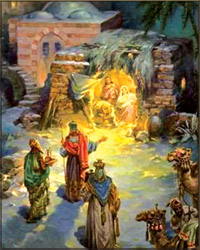|
Epiphany and the Twelve Days of Christmas
Did
you enjoy all the goodies and gifts of Christmas? Most of you may have
had a grand time with the many festivities and may even be feeling a bit
down about another Christmas coming to an end. But, according to ancient
tradition, Christmas wasn't over until January 6, which was known as
Epiphany.
 This
period from Christmas day to January 5 (the day before Epiphany) is
known as the Twelve Days of Christmas. However, it has been
misunderstood by most people to mean the twelve days leading to
Christmas. In some traditions, the first day of Christmas begins on the
evening of December 25 with the following day considered the First Day
of Christmas (December 26). In these traditions, the twelve days include
the Epiphany on January 6. This
period from Christmas day to January 5 (the day before Epiphany) is
known as the Twelve Days of Christmas. However, it has been
misunderstood by most people to mean the twelve days leading to
Christmas. In some traditions, the first day of Christmas begins on the
evening of December 25 with the following day considered the First Day
of Christmas (December 26). In these traditions, the twelve days include
the Epiphany on January 6.
The origin and counting of the Twelve Days is complicated, and is
related to differences in calendars, church traditions, and the
different ways of observing this day in various cultures.
In the Roman Catholic and Protestant churches (Western church),
Epiphany is usually celebrated as the time the Wise Men or Magi arrived
to present gifts to the young Jesus.
During Epiphany in Western churches, Biblical texts that describe the
various appearances of Jesus are read in church. In Eastern churches,
the event celebrates the baptism of Jesus. There, the major observance
is the blessing of baptismal water.
 In
some cultures, especially the Hispanic and Latin American, January 6 is
observed as Three Kings Day, or the Day of the Kings. Most of these
cultures consider January 6 as the day for giving gifts though they
celebrate Christmas on December 25. In some places, it is not unusual to
give Christmas gifts for each of the Twelve Days. In
some cultures, especially the Hispanic and Latin American, January 6 is
observed as Three Kings Day, or the Day of the Kings. Most of these
cultures consider January 6 as the day for giving gifts though they
celebrate Christmas on December 25. In some places, it is not unusual to
give Christmas gifts for each of the Twelve Days.
By the 16th century, some European and Scandinavian cultures had
combined these days with some olden day festivals celebrating the
changing of the year. These were usually associated with driving away
evil spirits for the start of the new year.
The Twelfth Night often included feasting along with the removal of
Christmas decorations.
The popular song 'The Twelve Days of Christmas', though usually
considered as a nonsense song for children, is believed by some to be a
song of Christian instruction dating to the 16th century religious wars
in England, with hidden references to the basic teachings of the Faith. |
